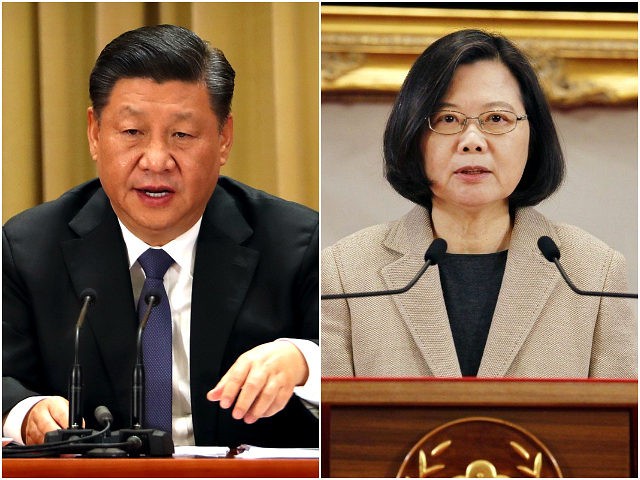Chinese President Xi Jinping warned Taiwan in a speech on Wednesday that independence was a “dead end” and reiterated his goal remains to reunify the island with mainland China, even if by force.
“Reunification is a historical trend and it is the right path. Taiwan independence is an adverse current of history and is a dead end,” Xi said, according to an English-language translation broadcast on state media reported by CNBC.
Xi also warned, in remarks aimed at the United States, that “foreign interference” on Taiwan is “intolerable.”
“The issue of Taiwan is part of China’s domestic politics. It is a core interest of China, and the … feelings of the Chinese people, and foreign interference is intolerable,” he said.
The speech was delivered to officials, military officers, and guests in the Great Hall of the People in Beijing, according to the New York Times.
“We make no promise to abandon the use of force, and retain the option of taking all necessary measures,” he also said, according to the Times.
The speech marked 40 years since a thaw in Sino-Taiwanese relations. After being defeated in a civil war by the communists, nationalists led by General Chiang Kai-shek fled to Taiwan and established a new government in 1949. Taiwan has been self-governing ever since but has never formally declared independence.
Beijing, however, considers Taiwan a breakaway province and not a separate nation and has vowed to someday reunify the island, including by force. Since Taiwan elected a pro-independence president from the Democratic Progressive Party in 2016, China has stepped up its efforts to internationally isolate it.
The status of Taiwan is a potential flashpoint between Beijing and Washington, with Washington opposing reunification by force and maintaining robust informal diplomatic relations with Taiwan. The Trump administration has stepped up U.S. support of Taiwan rhetorically and materially from the previous administration.
On Monday, President Donald Trump signed into law the Asia Reassurance Initiative Act, which reiterates U.S. commitment to a peaceful resolution of the status of Taiwan.
Xi in his speech characterized reunification as inevitable and said that China would respect Taiwan’s freedoms in a unified “one country, two systems” framework.
However, Taiwan rebuffed Xi’s remarks on Wednesday.
“Forced unification is a folly. #Taiwan is a free & democratic country where #HumanRights are protected. Only its 23 million people can decide their own destiny. The leader of #China must join the rest of the global community & respect this reality,” Taiwan’s Ministry of Foreign Affairs tweeted on Wednesday.
Forced unification is a folly. #Taiwan is a free & democratic country where #HumanRights are protected. Only its 23 million people can decide their own destiny. The leader of #China must join the rest of the global community & respect this reality.
— 外交部 Ministry of Foreign Affairs, ROC (Taiwan) 🇹🇼 (@MOFA_Taiwan) January 2, 2019
Taiwan’s President Tsai Ing-wen also responded in a tweet.
“As president of the Republic of China, I must stress that we’ve never accepted the ‘1992 Consensus,’ & the ‘four musts’ are crucial for positive cross-strait developments. I call on #China to bravely take steps towards democracy, so they can truly understand the people of #Taiwan,” she said, referring to four conditions to more positive relations.
As president of the Republic of China, I must stress that we’ve never accepted the “1992 Consensus,” & the “four musts” are crucial for positive cross-strait developments. I call on #China to bravely take steps towards democracy, so they can truly understand the people of #Taiwan pic.twitter.com/Wvgiy44Oc8
— 蔡英文 Tsai Ing-wen (@iingwen) January 2, 2019
The address was Xi’s first major speech as president devoted to Taiwan, China expert Bonnie Glaser told the New York Times.
She characterized the speech as a “reaffirmation of current policy” and noted the lack of any timetable or deadline for reunification. “It is just a goal,” she told the paper.
As far as his threat of reunification by force, she noted that Xi implied it would be a “last resort.”
“Of course, Xi has to leave that option on the table, but he makes clear it is not his preference,” she said.

COMMENTS
Please let us know if you're having issues with commenting.